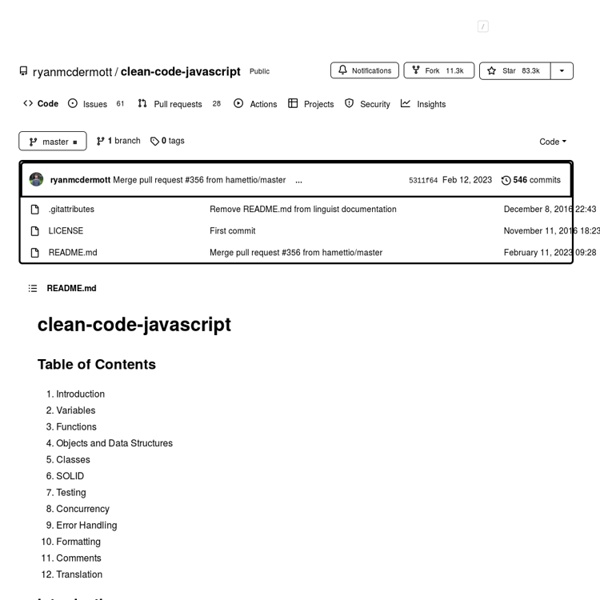



https://github.com/ryanmcdermott/clean-code-javascript
Related: Cours et Tutoriels sur le JavaScript • Création site internetMy favourite Javascript learning resources on Github □ - DEV I started to learn Javascript about a year ago, there are so many online tutorials, blogs, courses and even the GitHub, it's not only the place I push my codes, but also a place to learn! And I realised that the most important thing to learn any languages is to understand the core concepts of it and get your hands dirty. These are the curated resources on GitHub that I have used myself or at least gone through, so I can definitely recommend them. Fonctions sur les chaînes de caractères If you want a function to return all text in a string up to the Nth occurrence of a substring, try the below function. Works in PHP >= 5. (Pommef provided another sample function for this purpose below, but I believe it is incorrect.)
33 Fundamentals Every JavaScript Developer Should Know What can you do? What if someone finds out? Maybe that’s the REAL reason white boards scare you? Fret no more fellow developer. Les opérateurs Operator are used to perform operation. Operator are mainly divided by three groups.1.Uniary Operators that takes one values2.Binary Operators that takes two values3.ternary operators that takes three values Operator are mainly divided by three groups that are totally seventeen types.1.Arithmetic Operator+ = Addition- = Subtraction* = Multiplication/ = Division% = Modulo** = Exponentiation 2.Assignment Operator = "equal to 3.Array Operator + = Union == = Equality === = Identity != = Inequality <> = Inequality !
JavaScript Scoping and Hoisting Do you know what value will be alerted if the following is executed as a JavaScript program? var foo = 1; function bar() { if (!foo) { var foo = 10; } alert(foo); } bar(); JavaScript Logical Operators tldr; Logical operators are important in JavaScript applications. We constantly need to compare variables and do something based on that comparison. If some comparison is true, take path A; if it’s false, take path B.
/loupe/?code=Ly8gZmlyc3QsIGNhbGwgdGltZW91dCBmdW5jdGlvbiwgc2V0IHRvIHplcm8gc2Vjb25kcwpzZXRUaW1lb3V0KGZ1bmN0aW9uKCl7CiAgY29uc29sZS5sb2coJ0hleSwgd2h5IGFtIEkgbGFzdD8nKTsKfSwgMCk7Ci8vIGRlY2xhcmUgdHdvIGZ1bmN0aW9ucwpmdW5jdGlvbiBzYXlIaSgpewogIGNvbnNvbGUubG9nKCdIZW close Intro Loupe is a little visualisation to help you understand how JavaScript's call stack/event loop/callback queue interact with each other. The best thing to do to understand how this works is watch this video, then when you are ready, go play! Instructions JavaScript’s Memory Model - Ethan Nam - Medium In general, we should be using const as much as possible and only using let when we know a variable will change. Let’s be really clear about what we mean by “change”. A mistake is to interpret “change” as a change in value. A JS programmer who interprets “change” this way will do something like this:
Using CORS Introduction APIs are the threads that let you stitch together a rich web experience. But this experience has a hard time translating to the browser, where the options for cross-domain requests are limited to techniques like JSON-P (which has limited use due to security concerns) or setting up a custom proxy (which can be a pain to set up and maintain). Cross-Origin Resource Sharing (CORS) is a W3C spec that allows cross-domain communication from the browser. By building on top of the XMLHttpRequest object, CORS allows developers to work with the same idioms as same-domain requests. The use-case for CORS is simple.
JavaScript's Memory Management Explained Most of the time, you can probably get by fine not knowing anything about memory management as a JavaScript developer. Afterall, the JavaScript engine handles this for you. At one point or another, though, you'll encounter problems, like memory leaks, that you can only solve if you know how memory allocation works. In this article, I'll introduce you to how memory allocation and garbage collection works and how you can avoid some common memory leaks. How does JavaScript work in the browser?